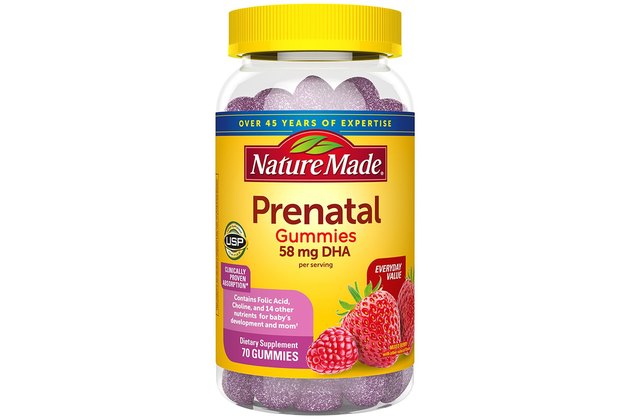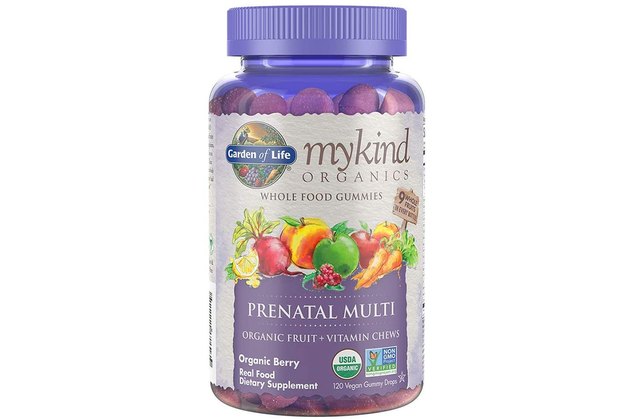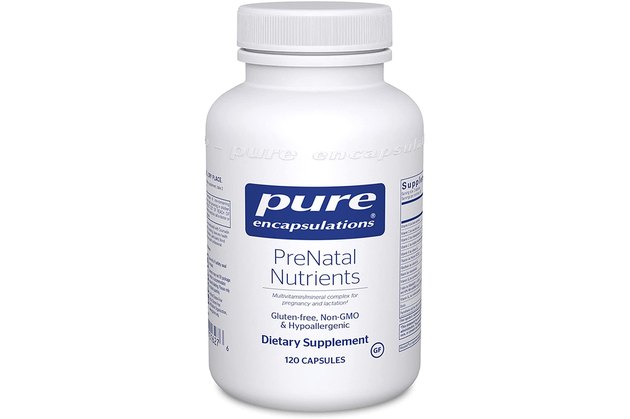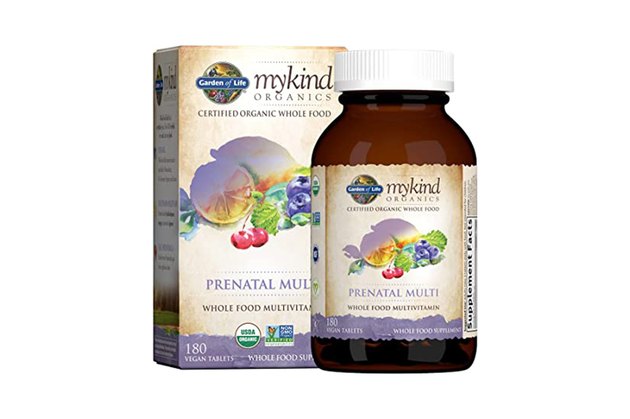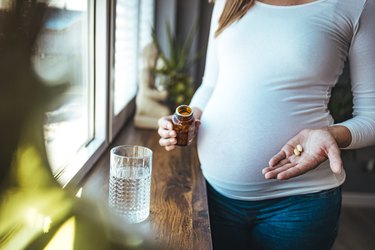
Constipation is a common side effect of pregnancy, and you might have heard that the increased iron in your prenatal vitamin is the root cause. It might be, but there are other possible reasons why your gut isn't moving along as smoothly as you would like.
That's why it's important to talk to your doctor about constipation during pregnancy and have a discussion about the right management options for you. If your doctor directs you toward a prenatal vitamin that doesn't cause constipation, here are the best brands to choose from.
Video of the Day
Video of the Day
The Best Prenatal Vitamins for Constipation
- Best Overall: Nature Made Gummy + DHA ($14.49, Amazon)
- Best Organic: Garden of Life MyKind Prenatal Gummies ($25.12, Amazon)
- Best Capsule: Pure Encapsulations Prenatal ($27.25, Pure Encapsulations Pro)
- Best Tablet: Garden of Life myKind Prenatal Multi ($53.99, Amazon)
How We Chose
We tapped expert McKenzie Caldwell, MPH, RDN, a fertility and prenatal dietitian, for her advice on what to look for in a prenatal vitamin to prevent constipation. Our top picks below are based on the following criteria:
- Third-party tested: These vitamins have been third-party tested to ensure they contain what is indicated on the bottle, in the correct amounts, and that they are not contaminated with heavy metals.
- Either don't contain iron, or contain iron bisglycinate: This is the form of iron Caldwell recommends when constipation from iron is a concern. "Ferrous sulfate is the form of iron that is most commonly recommended, and also, unfortunately, can cause constipation and digestive upset. When needed, I recommend my clients take iron bisglycinate, which is well absorbed and non-constipating."
- Contain folic acid or whole-food sources of folate: The folate source in prenatal supplements is currently a very controversial topic. The Centers for Disease Control and Prevention and American College of Obstetricians and Gynecologists both recommend folic acid as the primary folate source to prevent neural tube defects. Many prenatal supplements on the market today have replaced folic acid with methylfolate, the active form of folate. Methylfolate may be better absorbed in some people, per the National Institutes of Health (NIH), but it has not been extensively researched in the prevention of neural tube defects. That's why, for the purposes of this review, we've included only vitamins with folic acid or whole-food sources of folate. Talk to your doctor about which type of folate supplementation is appropriate for your needs.
Tip
It's important to know that these prenatals are not guaranteed to alleviate or prevent constipation. Ensure you eat a healthy diet, stay hydrated and stay active to help manage constipation during pregnancy.
1. Nature Made Prenatal Gummy + DHA
Pros
- Affordable
- Contains DHA, an omega-3 fatty acid that supports brain health
- Chewable
Cons
- Does not contain iron
- Some reviewers say it has a fishy flavor
If iron-containing supplements are the root cause of your constipation and you would like to take a non-constipating iron supplement separate from your prenatal supplement, then this Nature Made pick might be a good choice for you.
This gummy has necessary nutrients for pregnancy, such as vitamin D, choline, vitamin B12, iodine, folic acid and DHA. However, like most gummies on the market today, it does not contain iron.
Speak with your doctor about taking a separate iron supplement to fit your needs.
This supplement is third-party tested by USP, so you can have peace of mind when it comes to the safety of your supplement. It is also an inexpensive option to fill those nutrition gaps.
2. Garden of Life myKind Prenatal Gummies
Pros
- Organic
- Chewable
- Made from whole foods
- Most reviewers like the taste
Cons
- Does not contain iron
- Serving size is 4 gummies
Garden of Life is a trusted brand that uses whole-food ingredients in their multivitamins. This supplement also does not contain iron, so ensure you are talking with your doctor about a separate iron supplement, if needed.
Choosing a gummy vitamin for your prenatal can be helpful if you have issues swallowing pills, but not all contain each recommended nutrient for pregnant people. If you choose this supplement, make sure you get enough sources of choline (eggs, chicken, cod, beef, kidney beans, milk) and iodine (whole-wheat bread, milk, Greek yogurt, iodized salt) in your diet to meet your needs.
Garden of Life is USDA-certified organic, so you can be sure it has met rigorous standards for quality of ingredients.
3. Pure Encapsulations Prenatal Nutrients
Pros
- Contains iron
- Capsule form may be easier to take for people with nausea
Cons
- Pricey
- Does not contain DHA
Pure Encapsulations is a highly recommended brand, and this prenatal has the nutrients you are looking for in a supplement. This capsule contains 100 percent of the recommended amount of iron you need for pregnancy, and it is the preferred form that is less likely to cause constipation.
It also contains other essential nutrients for pregnancy, including vitamin B12, vitamin D, choline and iodine. It has a mix of folic acid and methylfolate to keep you covered with your folate needs.
It does not contain DHA, so ensure you are getting that from a separate supplement or through foods, such as salmon, canola oil, flaxseeds and edamame.
Pure Encapsulations is third-party tested with the labs disclosed on their website. It is one of the pricier brands, though, so ensure this supplement fits in your budget.
4. Garden of Life myKind Organics Prenatal Multi
Pros
- Organic
- Made from whole foods
- Contains iron
- Made with ingredients that support digestion
Cons
- Does not contain choline or DHA
- Some reviewers don't like the flavor
- Serving size is 3 tablets
This NSF-certified and USDA-certified organic supplement is a great choice for a prenatal and contains most of what you need for your pregnancy. This supplement is sourced from whole foods and contains folate, iron, vitamin D and iodine.
It does not contain choline or DHA, so it's important to get a recommendation from your dietitian on how to get these nutrients from your diet, or ask your primary care provider about an additional supplement.
This prenatal contains a digestive blend containing lemon, tomato, ginger and peppermint that may aid in reducing your risk of constipation.
What to Know Before You Buy
Here's what to look for in a quality prenatal vitamin that won't cause constipation:
1. Third-Party Testing
Every supplement recommended above has been third-party tested and approved or received a seal from one of the big three testers, NSF, USP or Consumer. Lab.
Third-party testing ensures that the supplement contains what it claims on the bottle in those amounts, not more or less. This is your peace of mind that you are getting what the supplement company indicates.
2. Fillers
If you have allergies or dietary restrictions, checking for fillers becomes very important. Of course, you don't want a lot of extra "junk" in your supplement in general, but it becomes even more important to check your labels if you do have any special conditions.
Some supplements contain gluten, dairy, soy, added sugar or artificial colorings, as well as others that might cause issues. Always turn the bottle over if you're looking for specific allergens.
3. Dosage
Always stick with the dosage on the label. Some supplements, especially gummies, will have you take more than one in a serving. To make sure you are getting all of the nutrition you need, follow the dosing instructions.
What Causes Constipation During Pregnancy?
ACOG indicates that constipation during pregnancy is defined as having three or fewer bowel movements in a week. You also might have abdominal pain or have stool that is hard and may be painful to pass.
There are myriad causes of constipation during pregnancy. Here are the most common along with natural remedies for constipation:
1. Vitamin and Mineral Supplements
During pregnancy, your iron needs increase substantially, not only for your baby, but for the increased blood volume in your own body. Because of this, many prenatals contain a higher iron amount than what you would see in a typical daily multivitamin.
Iron has often been the scapegoat for the constipation that comes with pregnancy, which is why you may consider one of the non-constipating supplements above.
2. Lack of Movement
It's only natural to take it easy during pregnancy, especially during the later months when it becomes an event to walk from the car to the grocery store. But sitting down and staying sedentary can slow down gut motility — not to mention that your bowels get a little more cramped.
Staying active with even light activity, such as walking, can help keep constipation at bay.
3. Hormones
ACOG indicates that hormones produced during pregnancy, most notably estrogen and progesterone, may also be on the list of constipation causes. Increases in these hormones have been tied to slowing down the digestive system.
4. Diet
It's no secret that diet plays a huge role in gut health and should be your first defense against constipation. Your body requires more fluid during pregnancy, and being dehydrated could be causing your constipation if you're not careful. In addition, your fiber intake could greatly affect your digestive movement.
Most plant foods contain both soluble and insoluble fiber. Soluble fiber can slow down your digestion, but insoluble fiber can speed it up. Ensure you are getting a good mix of both for good gut health.
When to See a Doctor
If you're concerned about your constipation, don't stop taking your prenatal, but put in a call to your doctor. There are ways to alleviate your constipation and still get the nutrition your body needs. Your prenatal supplement may not be the cause of your constipation.
Caldwell also offers a suggestion for all the pregnant or soon-to-be-pregnant people out there: "Proper positioning on the toilet using a stool or Squatty Potty can greatly help when struggling with pregnancy constipation," she says. "If you are experiencing pelvic pain or any urinary leakage in addition to constipation, pelvic floor physical therapy can be extremely beneficial."
Was this article helpful?
150 Characters Max
0/150
Thank you for sharing!
Thank you for your feedback!
